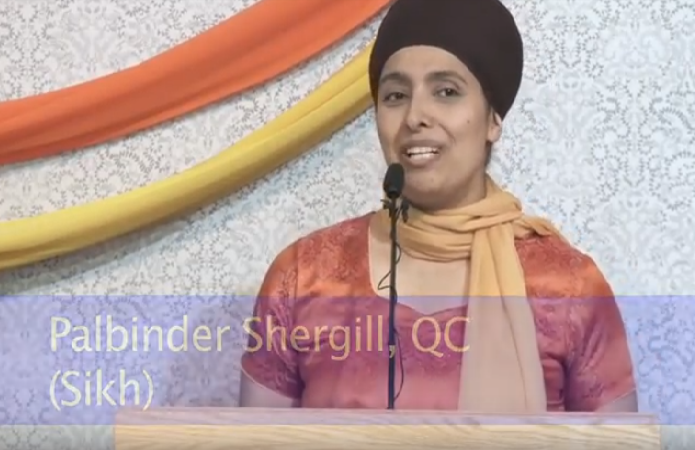
Early Life and Career
Palbinder Kaur Shergill was born in the village of Rurka Kalan in India’s Punjab state. She immigrated to Canada with her family at the age of four. She was raised in Williams Lake, British Columbia, by her parents, who taught her to advocate for those in need. She has credited her family’s influence as setting her on a path to pursue law. Shergill graduated with a law degree from the University of Saskatchewan in 1990 and was called to the British Columbia Bar in 1991.
Law Career
Palbinder Kaur Shergill was a trial lawyer who ran her own firm in Surrey, British Columbia. She appeared in courts and tribunals across Canada and worked mostly on personal injury, as well as civil and commercial litigation. It was her cases that addressed constitutional law, though, that earned her a reputation as a leading human rights lawyer in the country. She was appointed Queen’s Counsel in 2012.
Human Rights Cases
Palbinder Kaur Shergill represented the World Sikh Organization of Canada (WSO) in several landmark cases, including Syndicat Northcrest v. Anselem (2004). This case was brought against a condominium association in Montreal that had refused to allow Orthodox Jewish co-owners to erect sukkahs (temporary shelters) on their balconies during the Jewish festival of Sukkot (see also Judaism). The WSO was one of several interveners in the case, including the Evangelical Fellowship of Canada, Seventh-Day Adventist Church in Canada and Ontario Human Rights Commission. The Court decided that the condominium association had breached the appellants’ freedom of religion under the Quebec Charter of Human Rights and Freedoms.
Shergill also represented the WSO in Multani v. Commission scolaire Marguerite Bourgeoys (2006) regarding the right of Sikh students to wear a kirpan (ceremonial dagger) in schools. This landmark case, which took place in front of the Supreme Court of Canada, was seen as a victory for religious freedom in the country. The Supreme Court unanimously voted that Sikh students could carry a kirpan to school. This overturned a previous ruling by the Quebec Court of Appeal that effectively banned the kirpan, stating that it could be used as a potentially dangerous object. The Quebec government at the time supported the ban.
However, Canada’s top court ruled that a total ban violated the Canadian Charter of Rights and Freedoms. A portion of the decision read:
If some students consider it unfair that Gurbaj Singh may wear his kirpan to school while they are not allowed to have knives in their possession, it is incumbent on the schools to discharge their obligation to instil in their students this value that is…at the very foundation of our democracy. A total prohibition against wearing a kirpan to school undermines the value of this religious symbol and sends students the message that some religious practices do not merit the same protection as others.
In 2013, Shergill reflected on Sikh support for religious freedom. That year, she was a keynote speaker in the Power of Spirit series, an ongoing community engagement program of the Multifaith Action Society of British Columbia that nominates speakers of various faiths to reflect on their principles. In her speech, Shergill referenced the WSO’s support for the right of Muslim women in Quebec to wear the niqab, despite the Sikh belief that women should not cover their faces:
In Montreal, when a young Muslim woman wanted to wear the niqab in order to go out in public but was not provided with access to public facilities, government facilities, because she wore the niqab, it was therefore that the World Sikh Organization, in understanding and recognizing the path and the journey that is required and mandated for a Sikh, stepped forward and said, “Even though fundamentally we don’t believe that a woman should veil her face in public, we will protect your right to do so. We will protect your right to be able to freely practise your belief.”
Supreme Court Appointment
Palbinder Kaur Shergill was appointed to the Supreme Court of British Columbia in New Westminster on 23 June 2017. She replaced Justice E.A. Arnold-Bailey, who retired in May 2017. The announcement was made by Jody Wilson-Raybould, minister of justice and attorney general of Canada.
Indian media reported celebrations in the country upon her appointment. “She has brought the name of our village on the world map, and we are going to honour her extended family members here,” said the head of Rurka Kalan, the village where she was born.
Community Work
For 26 years, Palbinder Kaur Shergill provided pro bono counsel for the WSO. She also served as a board member for the Sikh Feminist Research Institute and presented various conferences on Sikh feminism.
Shergill served as board director for the Fraser Health Authority —British Columbia’s largest health authority —from 2002 to 2008. She also served as the chair of the Canadian Bar Association ’s administrative law section and as a governor for the Trial Lawyers Association of British Columbia.
Shergill’s extended family in India runs a non-profit computer and stitching centre for the underprivileged in the community in which she was born.
Personal Life
Palbinder Kaur Shergill is married to Amritpal Singh Shergill and has three children:her daughter, Mohenaam Kaur, and her twin sons, Meharban and Kurban Singh. She speaks English, Punjabi, Hindi and French.
Shergill is working toward a black belt in taekwondo and can play several classical Indian instruments, including the tabla and harmonium.

 Share on Facebook
Share on Facebook Share on X
Share on X Share by Email
Share by Email Share on Google Classroom
Share on Google Classroom